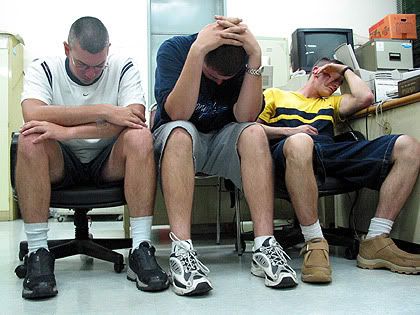Anti-Americanism, Korea And (Not) Cho
Two days ago, I was reading through a Hot Air live-blogging of the Virginia Tech massacres a couple hours after the fact, just to get caught up.
In the comments, which were written shortly after it was revealed that the murderer was a Korean, someone theorized that he may have been influenced by the strident anti-American teaching that is encouraged by the Korean Teachers Union (KTU), and he linked to US in Korea.org as a source for more info.
 Of course, the thread was incorrect, at least as far as Cho goes. Having moved to the U.S. as a toddler, he was not exposed to even elementary school in Korea. Korean kids today are exposed to such hate-mongering, however, according to the site.
Of course, the thread was incorrect, at least as far as Cho goes. Having moved to the U.S. as a toddler, he was not exposed to even elementary school in Korea. Korean kids today are exposed to such hate-mongering, however, according to the site.
The US in Korea site is quite an eye-opener! Let's just start with the subject that got me there: teaching. The site makes it clear that KTU, with 90,000 members, isn't the mainstream teachers' group there, but it's hardly small or fringe.
This excerpt is pulled from an an essay, Teaching Anti-US/USFK Thought To Children, from the site. [USFK is U.S. Forces/Korea]
 Had you heard this story?
Had you heard this story?
We defend the ocean shipping lanes, so Arab or North Korean terrorists cannot sieze the Gulf oil that keeps the Korean economy running, or the boats laden with goods that go ... where? To the U.S., where American dollars provide the capital to buy the oil to keep the economy running.
All this goes to show that global America hatred is at least as destructive as the Bush hatred of the American left. They hate us for two reasons: Fear of imperialism and fear of globalization.
The first is utterly irrational, even for a nation with U.S. troops on its soil. If we are imperialists, where are our colonies? Count the countries we've left.
And globalization? Korea would be a backwater wart on the coast of Asia were it not for globalization.
America has to do a better job of first understanding its newly evolved role in the world, then teaching it. We are not any threat whatsoever to any nation that is participating in the global economy and playing by the global rule sets. We are not a threat to any nation living in the squalor of the dysfunctional Gap, so long as they pay by the global rule sets; in fact, we'll do all we can to lift them out of the Gap and get them into the functional Core.
Nearly all our trouble comes from Gap nations that don't play by the rule sets: Iraq, Iran, North Korea, Somalia ... you know the list. Their leaders need to watch out, but they're the only ones who have to.
This is lost on the anti-U.S. people of Korea. And if we can't teach a nation we've so recently liberated, how can we expect to do well elsewhere?
In the comments, which were written shortly after it was revealed that the murderer was a Korean, someone theorized that he may have been influenced by the strident anti-American teaching that is encouraged by the Korean Teachers Union (KTU), and he linked to US in Korea.org as a source for more info.
 Of course, the thread was incorrect, at least as far as Cho goes. Having moved to the U.S. as a toddler, he was not exposed to even elementary school in Korea. Korean kids today are exposed to such hate-mongering, however, according to the site.
Of course, the thread was incorrect, at least as far as Cho goes. Having moved to the U.S. as a toddler, he was not exposed to even elementary school in Korea. Korean kids today are exposed to such hate-mongering, however, according to the site.The US in Korea site is quite an eye-opener! Let's just start with the subject that got me there: teaching. The site makes it clear that KTU, with 90,000 members, isn't the mainstream teachers' group there, but it's hardly small or fringe.
This excerpt is pulled from an an essay, Teaching Anti-US/USFK Thought To Children, from the site. [USFK is U.S. Forces/Korea]
Then came revelations about a highly anti-American "lesson plan" - that contained many, many pages - located on the KTU website and distributed to its several tens of thousands of members. The blatant nature of the propaganda value of the "teaching" material also (thankfully) created a backlash, but --- it found some sort of favor with President Roh Mun-Hyun. He criticized the plan intially, but then changed his mind after discussing it with his base of support - the one that carries as part of its platform a healthy dose of "bad America" and "USFK cancer."This isn't just college or high school fare; as I said before, the teaching now reaches down into the elementary schools of a country that would not exist were it not for the blood of American men.
Roh told the press the Union was merely anti-war, not anti-American."There is some exaggeration about the anti-Americanism class. In the process, people got it all wrong," he said.I have translated one of the "questions" in one of the lesson plans used in elementary school for you to see how non-anti-American is the group.
The Education Ministry briefed the president that the class materials used by the teachers` organization were likely to trigger anti-American sentiment among students. Nonetheless, President Roh backed down and directed that the matter not be considered any longer.Teaching material provided by the Unification Committee of the teachers union says: “The current Iraq war is "one-sided massacre without cause at the minimum level.”Teachers’ war propaganda
It further says: "The blood Iraqis bleed today heralds the death of Korean people tomorrow. This war is a prelude to a worldwide war and perhaps a step toward a war on the Korean Peninsula .”
This means that they do not hesitate to bully students who do not share their ideology. This is hardly an education. This is an act of ideological indoctrination with the intention of making students slaves of certain political thought.
 Had you heard this story?
Had you heard this story?These are the three soldiers attacked on the Seoul subway by a mob of anti-USFK activists including an ex-Korean lawmaker. The soldier on the right was the one held captive.This all defies logic. After we fought for Korea's freedom, we've maintained troops there which do not present an overwhelming presence in the nation by any means. Sure, sometimes a GI rapes a Korean woman or commits some other crime, but it's not common; certainly it's far less common than rapes of Korean women by Korean men.
More people in the United States should have the chance to understand the depths of the anti-U.S. Forces Korea (USFK) environment that our soldiers live under day to day, but the U.S. media skips even important events like the mob attack and captivity of a soldier on the Seoul subway.
The soldier was forced to attend and participate in an anti-USFK rally for several hours, made to make statements against himself and USFK, and then the Korean police threatened to charge him with assault. This did not make CNN, Fox, MSNBC, or the network tv news and only a couple of stories ran in the NY and LA Times.
We defend the ocean shipping lanes, so Arab or North Korean terrorists cannot sieze the Gulf oil that keeps the Korean economy running, or the boats laden with goods that go ... where? To the U.S., where American dollars provide the capital to buy the oil to keep the economy running.
All this goes to show that global America hatred is at least as destructive as the Bush hatred of the American left. They hate us for two reasons: Fear of imperialism and fear of globalization.
The first is utterly irrational, even for a nation with U.S. troops on its soil. If we are imperialists, where are our colonies? Count the countries we've left.
And globalization? Korea would be a backwater wart on the coast of Asia were it not for globalization.
America has to do a better job of first understanding its newly evolved role in the world, then teaching it. We are not any threat whatsoever to any nation that is participating in the global economy and playing by the global rule sets. We are not a threat to any nation living in the squalor of the dysfunctional Gap, so long as they pay by the global rule sets; in fact, we'll do all we can to lift them out of the Gap and get them into the functional Core.
Nearly all our trouble comes from Gap nations that don't play by the rule sets: Iraq, Iran, North Korea, Somalia ... you know the list. Their leaders need to watch out, but they're the only ones who have to.
This is lost on the anti-U.S. people of Korea. And if we can't teach a nation we've so recently liberated, how can we expect to do well elsewhere?
Labels: Foreign policy




<< Home